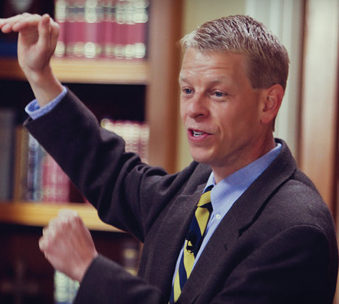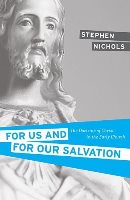Welcome as we continue our discussions here at Books At a Glance tracking out the Protestant Reformation in large strokes. I’m Fred Zaspel, and we’re talking again to Dr. Stephen Nichols about the Protestant Reformation. Today Dr. Nichols will talk again about some of the background to the Reformation.
Steve, welcome back!
Nichols:
It’s a pleasure to be back.
Zaspel:
How does the rise of nationalism and the breakdown of the international society held together by the glue of the Roman Catholic Church become a factor in the Reformation?
Nichols:
We look at the Reformation, and we want to see it as a spiritual, theological event. And we have to see it. We have to see how God used these reformers to bring about the Reformation. But it also occurred in a socio-cultural context, and it’s interesting to be paying attention to that. One of those pieces of that sociological or socio-cultural context was the rise of the modern nation state and the breakdown of the Holy Roman Empire. In fact I’ve heard a historian say the Holy Roman Empire was never really all that holy, not very Roman, and not much of an empire. But whatever it was, by the time of the Reformation it was really collapsing. An interesting thing is just to see this. So here is Jan Hus, and a century before Luther in the 1410s teaching in many ways similar things to Luther. He gets called before a church council at Constance and he is condemned as a heretic and he is martyred. A century later, here’s Luther. He’s up in Germany and he’s in Saxony, Germany and his noble, the Prince over that area is Frederick the Wise and he begins to teach these things, gets the attention of the Pope and the Pope says to Frederick the Wise, “Send this monk to Rome so he can be held accountable for his views.” And Frederick the Wise just says, “No. He is a German and he will have his day on German soil.” It shows how the Pope’s power and the Holy Roman Empire’s power, as it were, was slipping and fading. And Luther was able then to enjoy the protection of Frederick the Wise. Frederick the Wise said we have this diet, this conference, scheduled at Worms, and Luther will be tried there as a German. You want to say that that would not have happened in the 1400s; God can make anything happen that he wants to in his sovereignty, working through time and space. But it is interesting to see how even that context, how that impacted the Reformation and we could even say, facilitated Luther and the Reformation efforts.
Zaspel:
Martin Luther once said that the angel in the book of Revelation flying around the world preaching the gospel was actually the printing press. We might question his exegesis, but it does point to the importance of the printing press to the Reformation. In the providence of God, how important was the printing press? If the printing press had not yet been invented, would the Reformation have happened?
Nichols:
It was hugely important. This is again keeping with this conversation of how the sociological context was a factor. Prior to the printing press, you have a very laborious process of hand copying texts to distribute them. And that’s one of the reasons why we have the widespread illiteracy and why we do not have a lot of exchange of ideas, as it were. Along comes the printing press. Guttenberg in the city of Mainz, which curiously enough, the Reformation never really penetrated the city of Mainz, but very quickly every major city across Germany and across the face of the earth had a printing press. And this was absolutely central to the spread of the ideas of the reformers. So here’s Luther, pens his 95 theses, posts them to the church door. Someone pulls them down, goes and sets the print and blots the ink on the printer, gets the paper ready, and the next thing you know, hundreds of these things are rolling off the press and spread and distributed. And then someone translates them into German, and again they are printed and spread and distributed. And then, the Bible—think about Tyndale and his efforts to publish the Bible in the English text and what that meant for folks to have direct access to the Word of God and then the spread of the reformers ideas. It’s just remarkable, and you have to say that the printing press was a significant key. Maybe Luther did overstate it in his exegesis, but he’s on to something in showing how crucial that was to the spread of the Reformation.
Zaspel:
Discussions of the Reformation often don’t give attention to these background kinds of factors. How is it important and helpful to remember these as factors in the Reformation?
Nichols:
Well, one of the ways it’s helpful for us is to say, look at the world we live in. We lament technology quite a bit; we say it’s caused a sort of splintering. I see kids today, and they have their phones and their iPads—you know their universe is all of 12 inches, the distance between them and their screen. So we lament a lot of this, but what’s the flipside? Right? So the flipside is that we can disseminate the gospel and disseminate Christian teaching around the globe for a fraction of the cost by using technology. So we look at these things, these physical things that are created and we need to be good stewards. And so the printing press—good things have come off the printing press; bad things have come off the printing press, too. We as Christians look at these tools that we have in our day and age. How do we use those to spread the knowledge of the glory of God as the waters cover the seas. We can learn that from the reformers.
Zaspel:
It’s a marvelous look also, I think, at the providence of God in history to bring about his own purpose.
Nichols:
Yes.
Zaspel:
We’re talking to Dr. Stephen Nichols about the Protestant Reformation. Steve is President of Reformation Bible College and author of The Reformation: How a Monk and a Mallet Changed the World—as well as many other church history related books that you’ll want to check out on this page. He will be with us again to talk about John Knox and the Scottish Reformation, so you’ll want to stay tuned for that!
Steve, thanks so much for talking to us again today.
Nichols:
Well, my pleasure.
Editor’s Note: Below are some titles by Dr. Stephen Nichols that will be of interest to you!
The Reformation: How a Monk and a Mallet Changed the World
Paperback
Kindle
Martin Luther: A Guided Tour of His Life and Thought (Guided Tour of Church History)
Paperback
Kindle
The Church History ABCs: Augustine and 25 Other Heroes of the Faith
Paperback
Kindle
Welcome to the Story: Reading, Loving, and Living God’s Word
Paperback
Kindle
Jesus Made in America: A Cultural History from the Puritans to “The Passion of the Christ”
Paperback
Kindle
For Us and for Our Salvation: The Doctrine of Christ in the Early Church
Paperback
Kindle
Ancient Word, Changing Worlds: The Doctrine of Scripture in a Modern Age
Paperback
Kindle
Pages From Church History: A Guided Tour of Christian Classics
Paperback
Kindle
Heaven on Earth: Capturing Jonathan Edwards’s Vision of Living in Between
Paperback
Kindle
J. Gresham Machen: A Guided Tour of His Life and Thought (Guided Tour of Church History)
Paperback
Kindle
An Absolute Sort of Certainty: The Holy Spirit and the Apologetics of Jonathan Edwards
Paperback

